
AI threatens entry-level jobs across industries
Conservative Gen Z influencers Xaviaer DuRousseau and Isabel Brown join ‘America’s Newsroom’ to discuss the impact that AI is having on Gen Z’s job market, and how those who are embracing it are being rewarded.
NEWYou can now listen to Fox News articles!
Democrats in Washington are losing the AI conversation. Not because they are wrong about AI’s risks, but because they have failed to offer Americans a vision for the economic transformation ahead. While they focus on managing problems, others are defining what comes next. One side is talking about building the future, the other about constraining it.
In November, at Nvidia’s GTC conference in Washington, hundreds of technologists and business leaders celebrated a great American success story: Jensen Huang and the company he co-founded. The speakers praised President Donald Trump for his administration’s approach to AI. Many in the audience saw an administration that’s for removing barriers, enabling scale, improving American competitiveness.
This should be a wake-up call for Democrats, who have failed to seize the opportunity so far to speak not only to AI’s risks, but to its potential for broad economic transformation. Democrats have asked plenty of questions about AI’s safety, its biases and its effect on the job market.
But so far, Democrats have treated these as separate problems to manage rather than as pieces of a larger question: how do we shape this transformation so it creates opportunity for everyone, not just profits for a few? That’s the conversation Americans deserve.
THE NEW ARMS RACE IS FOR COMPUTE — AND AMERICA CAN’T AFFORD TO FALL BEHIND
DC Democrats need to reclaim the issue of AI from Republicans. (iStock)
The elite consensus in Washington focuses on one goal: optimize America’s AI capabilities as a whole. A recent Foreign Affairs essay by former Biden administration officials captures the “grand bargain” between government and industry: more infrastructure and capacity for big companies. Workers, communities and startups beyond the frontier are afterthoughts. Build first, assume prosperity trickles down later. It’s a familiar strategy that hasn’t delivered before. Republicans mostly embrace this framework as well, but Republican populists smartly recognize its shortcomings.
What this means going forward: Large companies positioned to capture trillions. Worker displacement a problem to solve later. Communities provide land, energy, and water without guarantees they’ll share in prosperity. The Biden administration’s 2023 executive order was comprehensive on safety testing but said little about prosperity, workers or communities.
Past waves of automation left communities hollowed out and workers without pathways forward. Innovation rarely distributes opportunity without deliberate efforts to strengthen workers, communities and local economies.
Recent polling in swing states shows AI sentiment declining as workers connect the technology to job insecurity. We all lose. Not to China, but to ourselves. The skepticism crosses ideological lines. On the far right, former Trump chief strategist Steve Bannon warned earlier this year that entry-level jobs will be destroyed. On the far left, Democratic Socialists see AI as another vehicle for corporate power. Both responses cede the possibility that AI could distribute opportunity rather than concentrate wealth.
TRUMP’S AI PLAN IS A BULWARK AGAINST THE RISING THREAT FROM CHINA
An alternative vision would optimize for the flourishing of American Davids: our workers, families, and innovative startups. Large companies’ long-term success depends on this foundation too. It’s not about slowing down. The capital is moving fast regardless. The question is whether we structure that rapid deployment to create broadly shared prosperity or concentrated extraction. Aimless speed creates the political backlash that actually threatens progress. Speed with a plan creates sustainable advancement.
We’ve done this before. Land grant universities gave communities stakes in research and education. Rural electrification co-ops gave farmers ownership, not just access. The GI Bill gave veterans leverage to build fulfilling careers, not just short-term compensation. Alaska’s Permanent Fund gives every resident dividends from oil extraction on public lands.
CLICK HERE FOR MORE FOX NEWS OPINION
Now imagine: National block grants enabling states to create public compute for startups and regional economies. Worker transition funds that workers control, not programs they endure. Equity stakes when companies profit from public infrastructure give communities ownership of their future. Third party assurance markets to accelerate responsible innovation at scale. These are ideas to prompt discussion with the American people. This moment calls for a national project worthy of American ingenuity.
Democrats have a long history with this thinking. Rural electrification and railroad policy ensured broad access. Today, Arizona Democratic Sen. Mark Kelly‘s “AI for America” proposal represents the kind of bigger vision we should debate.
Democrats have an opportunity now to pursue an alternative path and offer our country a national project that centers AI advances as the critical innovation for a prosperous, healthy, and safe future for all Americans.
Aimless speed creates the political backlash that actually threatens progress. Speed with a plan creates sustainable advancement. New technology alone is good. But it’s even better when paired with policy and market approaches that emphasize economic security, opportunity and dignity for the American people.
CLICK HERE TO DOWNLOAD THE FOX NEWS APP
Democrats are flat-footed. Anxiety is rising among populists on the right and left. The urgent question now is whether either party will challenge the elite consensus that treats the impacts of economic transformation on workers, communities and startups as either imaginary or problems to solve later.
This moment demands a vision that accounts for all Americans, our workers, communities, and startup entrepreneurs most especially.
